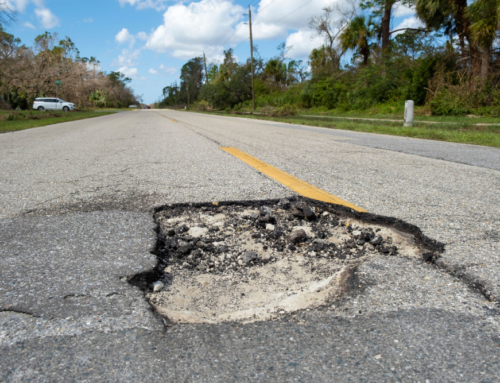Car accidents are one of the leading causes of traumatic brain injuries (TBIs), which can have life-altering consequences for victims. A TBI occurs when the brain is injured due to sudden impact or force, often leaving long-term physical, cognitive, and emotional damage. At Payas, Payas, and Payas, we understand the severe consequences of these injuries and are committed to helping victims seek the compensation they deserve. In this article, we will explore the connection between car accidents and TBIs, the symptoms to watch for, and the importance of seeking legal and medical assistance.
How Car Accidents Lead to Traumatic Brain Injuries
The Mechanics of Brain Injuries in Car Accidents
The violent impact of a car accident creates the perfect environment for traumatic brain injuries to occur. During a collision, the head can be thrown forward, backward, or to the side, causing the brain to move within the skull. This rapid movement results in the brain striking the inside of the skull, leading to bruising, bleeding, or even tearing of brain tissue. In severe cases, this can lead to a loss of consciousness, swelling of the brain, or permanent damage to brain function.
Various types of traumatic brain injuries can occur in a car accident, including concussions, contusions, and diffuse axonal injuries. Concussions are the most common form, often caused by the head striking the steering wheel, dashboard, or other parts of the vehicle. Diffuse axonal injuries, which involve tearing of brain tissue, occur when the brain is subjected to a strong rotational force, as can happen in high-speed collisions or rollovers.
Common Causes of TBIs in Car Accidents
Several factors contribute to traumatic brain injuries in car accidents. Head trauma is often caused by the head striking an object, such as the windshield, steering wheel, or seatbelt. Even airbags, while they can prevent more severe injuries, can cause TBIs in some cases due to the sudden force they exert when deployed.
Whiplash, a common injury in rear-end collisions, can also contribute to traumatic brain injuries. While whiplash typically affects the neck and spine, the sudden jerking motion can cause the brain to slam into the skull, leading to a concussion or other forms of TBI. Victims of rollover accidents are also at a high risk of traumatic brain injuries due to the intense rotational forces involved in these types of crashes.
Symptoms and Long-Term Effects of Traumatic Brain Injuries
Recognizing the Symptoms of a TBI After a Car Accident
The symptoms of traumatic brain injuries vary widely depending on the severity of the injury. Some symptoms are immediately apparent, while others may take hours or even days to manifest. After a car accident, it is essential to be aware of both physical and cognitive symptoms that could indicate a TBI.
Common physical symptoms include headaches, dizziness, nausea, vomiting, and blurred vision. Victims may also experience sensitivity to light and sound, difficulty balancing, and fatigue. Cognitive symptoms may include confusion, memory loss, trouble concentrating, and difficulty processing information. In severe cases, individuals may lose consciousness or experience seizures.
Emotional and behavioral changes are also common in TBI victims. Mood swings, irritability, anxiety, depression, and even changes in personality can result from damage to certain areas of the brain. Because the brain controls so many aspects of a person’s functioning, even a mild TBI can lead to profound changes in daily life.
The Long-Term Impact of a TBI
The effects of a traumatic brain injury can last for weeks, months, or even years, depending on the severity of the injury. In some cases, victims may experience permanent damage that affects their ability to work, maintain relationships, or enjoy everyday activities. Cognitive impairments like memory loss and difficulty concentrating can make it difficult for victims to return to their previous occupations. Emotional and psychological effects, such as depression, anxiety, and post-traumatic stress disorder (PTSD), are also common among TBI survivors.
Physical disabilities, including chronic headaches, dizziness, and impaired coordination, can severely limit a person’s independence. For some victims, long-term rehabilitation is required, which may include physical therapy, occupational therapy, speech therapy, and counseling. The costs associated with these treatments can be overwhelming, especially when combined with lost wages and other financial hardships.
The Importance of Immediate Medical Attention
Why Early Diagnosis Matters
One of the most critical steps in addressing a traumatic brain injury is seeking immediate medical attention. TBIs can be challenging to diagnose because many symptoms are not immediately apparent. However, even mild injuries can have severe consequences if left untreated. A doctor will perform imaging tests, such as CT scans or MRIs, to determine the extent of the injury and recommend appropriate treatment.
Early intervention is key to preventing further damage. If you experience any symptoms of a TBI after a car accident, it is essential to consult a medical professional, even if you feel fine initially. Some people may believe that mild concussions will heal on their own, but ignoring the signs of a brain injury can lead to long-term complications.
The Role of Medical Experts in TBI Claims
In a personal injury claim, medical documentation plays a crucial role in proving the extent of your injury and securing compensation. A medical expert can testify about the severity of your TBI, the treatment you require, and the long-term prognosis for your recovery. This testimony is critical for demonstrating the full impact of the injury on your life, particularly when negotiating with insurance companies or presenting your case in court.
An experienced personal injury attorney will work closely with medical experts to ensure that your medical records, treatment plans, and expert testimony are effectively presented in your claim. This collaboration helps maximize your compensation for both current and future medical expenses.
The Legal Process: Seeking Compensation for a TBI After a Car Accident
Proving Negligence in TBI Claims
To recover compensation for a traumatic brain injury resulting from a car accident, you must prove that another party’s negligence caused the accident. Negligence occurs when a driver fails to act responsibly and causes harm to others. Common examples of negligence in car accidents include speeding, distracted driving, driving under the influence, and failing to obey traffic signals.
Establishing negligence involves gathering evidence such as police reports, witness statements, and any available video footage. Medical records and expert testimony are also crucial in proving the extent of your injuries and the connection between the accident and the TBI. An experienced personal injury attorney can help you navigate this process and build a strong case to prove negligence and secure compensation.
Types of Compensation Available for TBI Victims
Victims of traumatic brain injuries are entitled to various types of compensation, depending on the circumstances of the accident and the severity of the injury. This compensation typically includes medical expenses, lost wages, pain and suffering, and the costs associated with long-term care or rehabilitation. In cases of severe or permanent injuries, compensation may also include future lost income, home modifications, and the cost of assistive devices.
In addition to economic damages, victims may be entitled to non-economic damages for the emotional and psychological impact of the injury. Traumatic brain injuries often lead to significant emotional distress, changes in relationships, and loss of enjoyment of life. An experienced attorney can help you quantify these damages and pursue the compensation you deserve.
The Role of a Personal Injury Attorney in TBI Cases
Why You Need Legal Representation
The legal process surrounding traumatic brain injury claims is complex and can be overwhelming for victims and their families. Insurance companies often try to minimize the compensation paid out in TBI claims, arguing that the injuries are not as severe as claimed or that they were pre-existing conditions. A personal injury attorney with experience in TBI cases can protect your rights and ensure that you receive fair compensation for your injuries.
An attorney will handle all aspects of your case, from gathering evidence to negotiating with insurance companies and, if necessary, representing you in court. With an experienced legal advocate on your side, you can focus on your recovery while your attorney works to secure the compensation you need to cover medical expenses, lost wages, and other damages.
How an Attorney Can Maximize Your Compensation
A skilled personal injury attorney understands the full scope of damages that may be available in a traumatic brain injury case. They will thoroughly investigate your accident, consult with medical experts, and ensure that all current and future damages are accounted for in your claim. By working closely with your medical team, your attorney can accurately calculate the long-term costs of your injury, including ongoing medical care, rehabilitation, and loss of earning potential.
In addition to economic damages, your attorney will also fight for compensation for the emotional and psychological toll of your injury. Traumatic brain injuries can affect every aspect of a person’s life, and it’s essential to seek compensation that reflects the full impact of the injury on your quality of life.
Conclusion: The Importance of Acting Quickly After a Car Accident
Traumatic brain injuries are among the most severe consequences of car accidents, often leaving victims with lifelong challenges. Understanding the connection between car accidents and TBIs is crucial for ensuring that victims receive the medical care and compensation they need to rebuild their lives. If you or a loved one has suffered a TBI in a car accident, it’s essential to seek medical attention immediately and consult with an experienced personal injury attorney.
At Payas, Payas, and Payas, we are dedicated to helping car accident victims recover the compensation they deserve for their injuries. If you or a loved one has suffered a traumatic brain injury due to a car accident, contact us today for a free consultation. Our experienced team will work tirelessly to protect your rights and secure the compensation you need for medical care, lost wages, and long-term recovery. Don’t wait—act now to get the justice you deserve and start the path to recovery.








